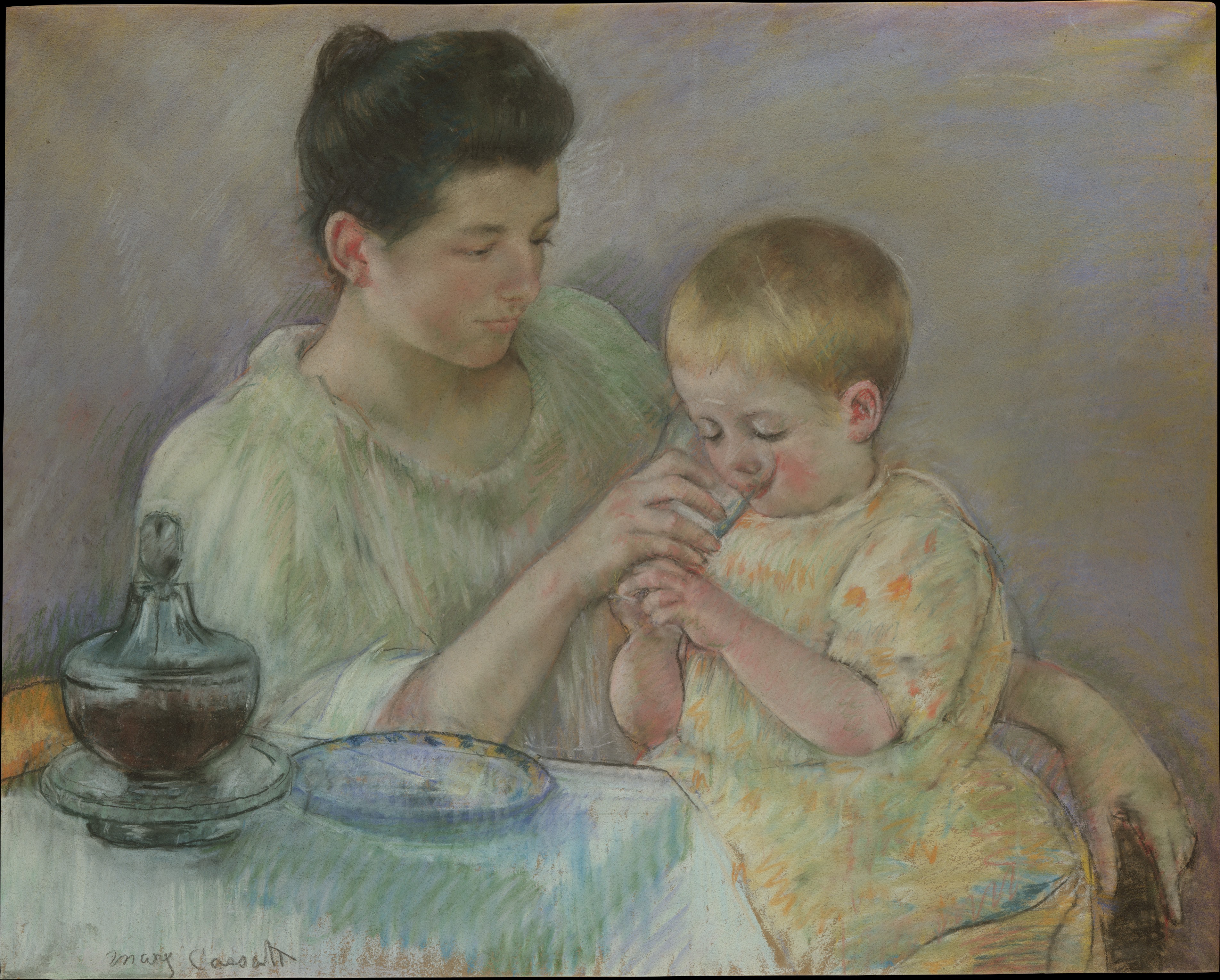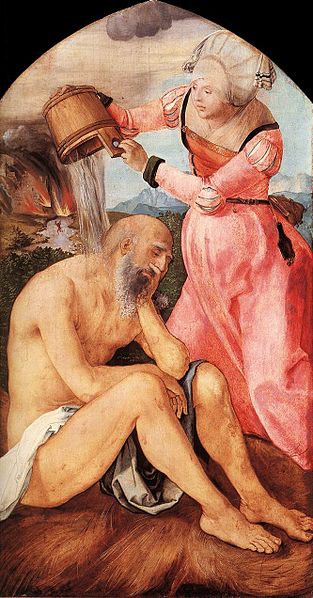1. Wenn Geburt doch so
einfach wäre
Liebe Gemeinde,
Am vergangenen Wochenende
war ich in Bischofszell zu den "Bischofszeller
Weihnachtsspielen". In der ganzen Altstadt verteilt wurde von
Station zu Station die Weihnachtsgeschichte vorgespielt, vom Besuch
des Engels bei Maria über die Reise nach Bethlehem, die Abweisung
beim Wirtshaus und die Geburt im Stall, bis zur Ankunft der Hirten
beim neugeborenen Kind. Es war ein sehr besonderes Erlebnis und sehr
schön gemacht.
Etwas, das mir besonders
zum nachdenken gegeben hat, war die Geburt. Maria und Josef kamen
beim Stall an, und der Erzähler sagte, dass die Zeit der Geburt
gekommen war. Maria und Josef gingen hinein. Kurz darauf kamen sie
wieder heraus, Maria mit dem Kind auf dem Arm.
"Das war wohl eine
Sturzgeburt," hat jemand neben mir bemerkt, und ein paar haben
gekichert.
Ja, wenn das doch nur so
einfach wäre! Schwuppsdiwupps, da ist das Kind. Keine Mühe, keine
Schmerzen, es ist einfach da. Erholung braucht die Mama danach auch
keine, sie sieht frisch aus und zufrieden. Das Kind ist herzig und
lieb und liegt still und brav da, hält schön hin für den ganzen
Besuch.
Ja, so stellen wir das
doch dar, alle Jahre wieder, in Bildern, in Krippenszenen, auch in
unseren Liedern. "Stille Nacht, heilige Nacht" – alles
schön ruhig und friedlich, Maria und Josef, die glücklichen Eltern,
beide frisch und gut ausgeruht, "in reinlichen Windeln das
himmlische Kind, viel schöner und holder als Engelein sind."
Sogar Futterkrippe und Stall sind sauber und ordentlich. Alles ist
schön, alles ist sauber, alles ist friedlich.
Aber
sind wir mal ehrlich: so sieht es bei einer Geburt nicht
aus.
2. Wie es
(wahrscheinlich) eigentlich war...
Stille Nacht? Für Josef
und Maria ist es nicht besonders still. Und das Lied trägt dem auch
Rechnung, denn es heisst: "Einsam wacht / nur das traute
hochheilige Paar." Einsam wacht. Für sie ist das eine strenge
Nacht.
Zuerst der ganze Stress,
einen Platz zu finden, wo Maria gebären kann, in diesem Ort so weit
weg von daheim. Reisen in der Spätschwangerschaft ist sicher nicht
so angenehm, mit dem immer unpraktischer werdenen Körper.
Beschwerden – vielleicht hat sie Sodbrennen, vielleicht bekommt sie
Wassereinlagerungen, sie wird schneller müde, vielleicht kann sie in
der Nacht schlecht schlafen, weil der Bauch ihr im Weg ist oder das
Kind zu fest tritt. Vielleicht ist Maria ungeduldig, endlich ihr Kind
kennenzulernen – und freut sich, wenn es jetzt endlich, endlich
losgeht. Aber vielleicht hat sie auch Angst, was da auf sie zukommt.
Geburt ist ja nicht ungefährlich, weder für die Mutter noch für
das Kind, damals noch mehr als heute.
Steht ihr ausser Josef
noch jemand zur Seite, um sie zu unterstützen? Wie geht sie um mit
den Schmerzen, in dieser Zeit, in der Schmerzmittel noch gar keine
Option sind? Nicht alle Frauen tönen während der Geburt – ist
Maria eine, die stumm bleibt, oder muss sie lauthals schreien? Geht
die Geburt lang, oder ist das Kind schnell da? Bekommt sie Risse oder
andere Geburtsverletzungen?
Und dann ist es endlich
da, das Kind – der "holde Knabe im lockigen Haar".
vielleicht sieht er etwas zerquetscht aus; viele Neugeborene sind am
Anfang etwas gräulich-blau, runzlig, nass. Weiss nicht, ob irgend
jemand ausser Maria in dem Moment ihn "schöner und holder als
Engelein" gefunden hat. Und die reinlichen Windeln sind sicher
nicht so lange reinlich geblieben, hoffentlich nicht – ich weiss
noch, wie wir auf das erste Bisi bangen mussten weil es sich etwas
verspätet hat und das nicht gesund gewesen wäre.
Einsam wacht: die strenge
Nacht geht weiter. Vielleicht kann Josef erschöpft einschlafen. Ob
Maria schlafen kann? Sie braucht die Erholung, aber vielleicht sind
die Glückshormone zu stark und halten sie wach, vielleicht muss sie
aufbleiben und dieses wunderbare Wesen anschauen, berühren,
bewundern. Vielleicht hält das Kind sie wach mit Stillen. Vielleicht
kann sie nicht einschlafen, weil jetzt die Sorgen anfangen: Geht es
meinem Kind gut? Ist alles in Ordnung? Atmet es noch? Vielleicht muss
sie immer wieder einen Finger über die Nase des Kindes halten um
sicherzustellen, dass er noch atmet.
Einsam wacht: nicht mehr
ganz einsam, sobald die Hirten eintrudeln. Dann haben sie
Gesellschaft. Wollen sie die überhaupt? Sind sie überhaupt bereit
dafür? Maria hat eine riesengrosse innere Wunde und kann vielleicht
kaum aufstehen und laufen. Sie hat gerade eine ganze Nacht schwerste
körperliche Arbeit geleistet. Duschen im Stall kann man vergessen.
Sie ist verschwitzt und verklebt und es tut noch alles weh. Und da
stehen plötzlich lauter Fremde – und auch nicht gerade die
willkommensten Fremden. Hirten gehörten damals zum Rand der
Gesellschaft, wahrscheinlich waren diese Menschen zerlumpt und
dreckig und gaben keinen besonders vertrauenswürdigen Eindruck.
"Redliche Hirten", was für ein Widerspruch, hätte man
damals gesagt. Das sind nur unredliche Leute.
Und so haben wir unsere
Krippenszene: blutig, schwitzig, dreckig, es müffelt nach Tier und
nach Körperflüssigkeiten, da ist Erschöpfung und Schmerz, auch ein
bisschen Sorge und Angst.
Aber da ist auch Freude.
So viel grosse, unaussprechlich grosse Freude. Eine Freude wie nach
jeder Geburt, wenn das Kind da ist und es Mutter und Kind gutgeht.
Und noch etwas mehr: die Freude an diesem ganz besonderen Kind.
Emmanuel – Gott mit uns. Gott ist Mensch geworden. Mitten in all
dem Blut und Schweiss und Dreck ist Gott. Nicht im Sterilen, Reinen,
Perfekten sondern in diesem total irdischen, total körperlichen,
total menschlichen, ja fast tierischem Geschehen.
3. Das geht doch nicht
Liebe Gemeinde,
Wird es uns unangenehm,
wenn wir uns die Geburt Jesu so vorstellen? Stört es uns, wenn sie
anders dargestellt wird als wie gewohnt schön, sauber, rein und
friedlich? Vor einigen Jahren machte ein Bild auf den sozialen Medien
die Runden, wo Maria schreiend das Jesuskind herauspresst. Es gab
viele negativen Reaktionen. Das geht doch nicht! Das ist doch
unwürdig, das ist respektlos!
In einem Artikel über
Tabus rund um die Geburt habe ich gelesen: "Wenn die Frau
schreit vor Schmerzen, den Stuhlgang nicht kontrollieren kann, Blut
fliesst, dann empfinden manche Männer das als erschreckend, eklig
und entwürdigend für ihre Frau." Da
ist es klar, dass es für unsere fromme Sensibilitäten schwierig
sein kann, die "reine Jungfrau Maria" so zu sehen. So eine
Darstellung kann einem fast blasphemisch vorkommen.
Oder neuerdings habe ich eine Zeichnung gesehen von einem Baby, dem gerade der Po
gewischt wird – der Titel: "Allmächtiger Gott". Da kommt
einem doch eine instinktive tiefe Ablehnung hoch. Das geht doch
nicht. Das kann man doch so nicht denken.
Das Heilige hat doch mit
dem Irdischen, mit dem Menschlichen, mit dem Körperlichen nichts zu
tun. Und auch wenn wir glauben, dass Gott Mensch geworden ist, fällt
es uns extrem schwer, das in seiner ganzen Konsequenz durchzudenken
und zu akzeptieren. Gott ist ein Kind in Windeln geworden, und wir
wissen was Kinder in Windeln machen, und da ist nichts besonders
reinliches dran. Das passt uns aber so gar nicht in den Kopf. Es
fühlt sich so falsch an.
Und das, liebe Gemeinde,
ist für mich das Wunder von Weihnachten.
4. Das Wunder von
Weihnachten: Gott wird ganz Mensch
Das Wunder von
Weihnachten ist, dass Gott ein schreiendes, kötzelndes Kind wird.
Das Wunder von Weihnachten ist, dass Gott, statt einfach vom Himmel
herabzusteigen, wie er es sehr wohl gekonnt hätte, den Weg der
Geburt ausgesucht hat, mit allem was dazu gehört. Das Wunder von
Weihnachten ist, dass das Heilige nicht abgehoben, unnahbar und
überperfekt ist, sondern dass es sich ganz in das Allermenschlichste
eintaucht.
Es ist so in uns
eingeprägt worden: Geist gut, Körper schlecht. Das Heilige,
wohlwollend aber auf Abstand. Gott sagt an Weihnachten, dass das
nicht so ist. Er wird Mensch und heiligt damit unsere menschlichsten
Erfahrungen. Gerade das Körperliche, auch das Unattraktive, sogar
das Dreckige wird Raum für das Heilige, Begegnugnsraum mit Gott.
Das will uns Mut machen.
Mut machen, dass Gott uns nahe kommen will. Dass Gott in all unseren
Erfahrungen da ist, unser ganzes Menschsein mit all seinen Facetten
mit uns teilt. Die Krippe ist kein unmöglicher, ferner, idyllischer
und perfekter Ort, sondern der Ort, wo Gott unsere Unvollkommenheit
heiligt. Gerade unsere Unvollkommenheit hat er erwählt. An
Weihnachten träumen wir nicht von unmöglicher Idylle, sondern Gott
erinnert uns: der Friede auf Erden kommt in dem ganz normalen, Gott
kommt zu uns, wie wir gerade sind. Er hat keine Berührungsängste.
Auch wir dürfen uns in dieser Geschichte finden, an der Krippe, so
wie wir sind. Und an dieser Krippe können wir Kraft schöpfen,
Hoffnung schöpfen, nicht weil da eine heile Welt ist, sondern weil
Gott sein Heil in unsere Welt hineinbringt, mitten hineinbringt. In
unsere Krankheit, in unsere Trauer und unseren Verlust, in unsere
Sorgen und Ängste, in die Banalitäten des Alltages, in unsere
kleinen und grossen Freuden, in unsere ganz menschlichen Erfahrungen
– da wird Gottes Heil geboren, da können wir es jeden Tag erleben,
weil Gott an einem Tag vor langer Zeit geboren wurde, so wie jedes
Kind geboren wird.
Amen




